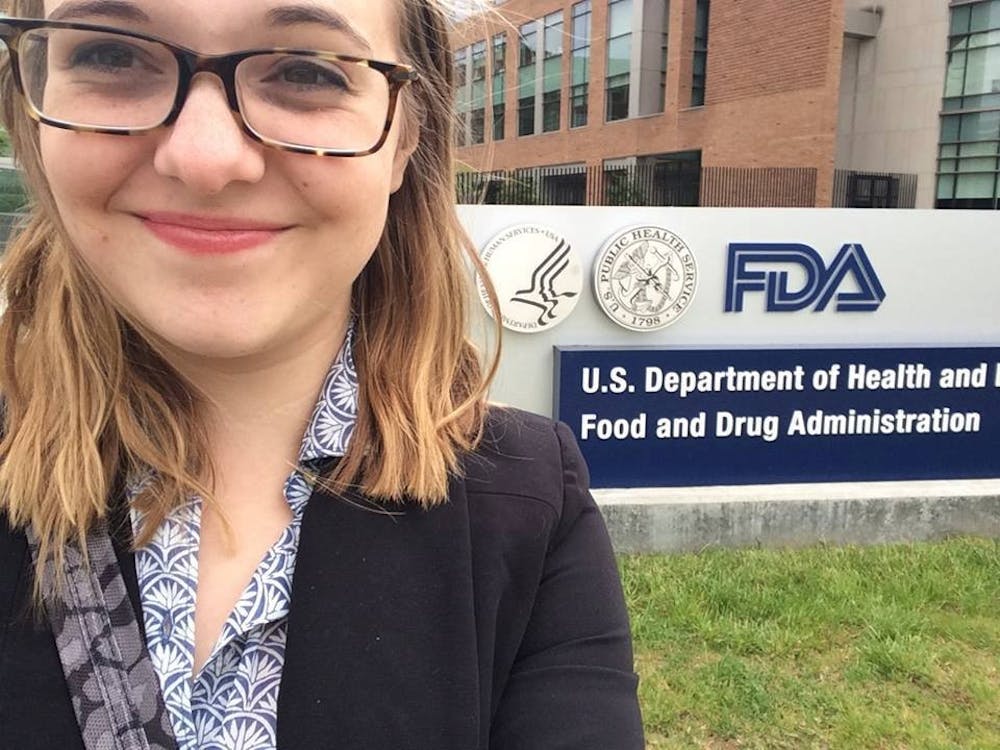AU students are on the go year-round, and that only intensifies as the temperature gets warmer and the spring semester ends. From political conventions in California to volunteer trips in South America and beyond, summer takes students away from AU and into the world around them. This summer, the Eagle is launching a summer series chronicling their adventures. Join us as we publish a new story weekly on how students are spending their summer #AwayFromTheNest before they return to campus in the fall.
Rising senior Rain Freeman started her summer this year interning in the Risk Communication Department at the Food and Drug Administration, the department responsible for communicating health risks to the public. A summer at the FDA fits both her majors: Public Health and Justice and Law. Prior to interning at the FDA, Freeman interned at the Mental Health Association of Montgomery County, the Metropolitan Police Department for the District of Columbia and the Bazelon Center for Mental Health Law. Last week, Freeman took time out to discuss her new internship at the FDA via Facebook as part of our summer series, #AwayFromTheNest.
Eagle: What exactly are you doing this summer at the FDA?
RF: I am a Risk Communication Staff (RCS) intern, which means that I assist RCS staff members and clients in any way that is needed. For the time being, a bulk of my work consists of qualitative analysis that consists of me using qualitative coding methods to comb data for themes. Additionally, sometimes I sit in on meetings with potential RCS clients or help update materials for the Risk Communication Advisory Committee website.
Eagle: What made you interested in this internship?
RF: I am very interested in public health program management, assessment and research and RCS does a lot of assessment and program research in order to find ways to help the FDA effectively communicate risk information. It’s something I really believe in and am passionate about. I am glad I was able to find the listing on the AU Career Web.
Eagle: What is the most exciting aspect of the job?
RF: I think I am most excited about the message testing aspect. This is where the staff tests messages for clients with certain risk information in order to see how it is perceived. For example, maybe I want to communicate to the public and consumers that my health product has side effects, but I am not sure the best way my message will be received. RCS will test messages similar to that in order to gather feedback.
Eagle: What are some of the most pressing issues facing the FDA?
RF: The FDA is composed of multiple centers having to do with either drug evaluation and research, tobacco control, medical devices, food safety and more. These centers all have their own most pressing issues. I would say, and this is very biased due to my background in health communications and my placement on the Risk Communication Staff, that the most pressing issue facing the FDA as a whole has to do with finding ways to provide information for the public to make their own healthy choice without unintended side effects that actually do the opposite.
The FDA realizes that putting a warning label on a certain product that may have dangerous side effects could also have the unintended consequence of people who need it not taking advantage of it, or the product being taken off the market by providers and therefore not being available to those who need it. Every action the FDA makes has consequence, whether the decision is “good” or “bad.” There are a lot of different, more specific problems individual FDA centers are having. However, I think they all face this obstacle in some form.
Eagle: What has been your biggest challenge so far (personally or professionally)?
RF: Commuting is hard. I can take FDA shuttles, Maryland RideOn, or D.C. Metrobus, but no matter which route I take, I have to wake up pretty early and commuting takes around an hour and 15 minutes. It’s worth it though. The campus is gorgeous!
Eagle: How do you think this internship will help you achieve future goals? Would you recommend it to other AU students?
RF: I think this will be very helpful experience as I narrow down the programs I am applying to for graduate school, as well as experience that will hopefully help spearhead future research I hope to conduct on my own. I would definitely recommend this to AU students interested in public health, health communications, health policy or health literacy issues.





